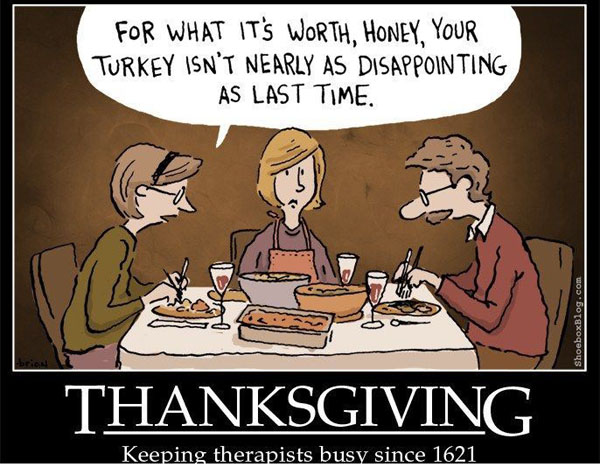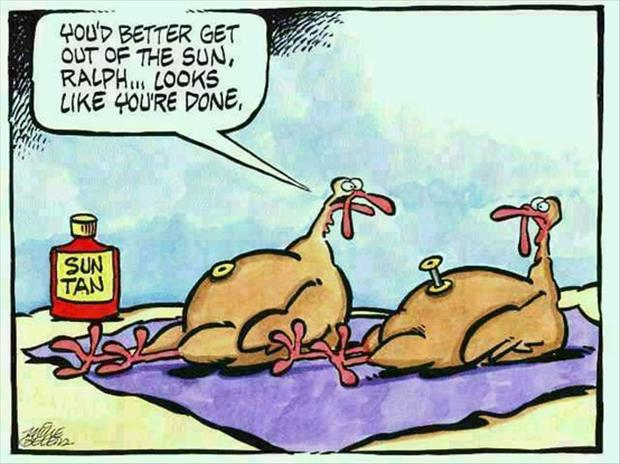Just How Thankful Are We?
“Thanksgiving Day is a jewel to set in the hearts of honest men; but be careful that you do not take the day and leave out the gratitude.”
– E.P. Powell, Journalist and Author
“Grateful people are happy people, research shows,” says the Greater Good Science Center of the University of California (Greater Good, 2015). We looked at the benefits of gratitude last time when we also looked at the ways a person could become more grateful over these 30 days of November.
Has it worked? How can we tell? Here are some empirically tested self-administered quizzes that we can take! Exciting, right? Just click on the bolded header, or in the reference notes below.
The GRAT (Gratitude, Resentment and Appreciation Test)
The GRAT is a pen-and-paper test designed to rate our “conceptualization of gratitude” in our lives. The higher our appreciation number at the end, contrasted by a lower resentment number, the more grateful we are. The authors assert that “a grateful person would not feel deprived in life, they would have a sense of abundance. They would acknowledge the contribution of others to their success and well-being, would appreciate life’s simple pleasures, and would acknowledge the importance of experiencing and expressing gratitude,” thus their test asks us direct questions about such things (Watkins et. al., 2003). Finding the results of this test, if we are concerned about our resentment number, does involve reverse-scoring some items.
The Appreciation Scale, developed by psychologists Mitchel Adler and Nancy Fagley, is different from the other two quizzes, because it measures the frequency at which we are thankful and feel grateful. It’s a look at a more actively grateful life. It’s a self-scoring online test which computes a numerical ranking on a scale of 105, the higher the better. As much of the gratitude-building research we looked at last time would assert, the ranking we have can be increased simply by practicing some of the action items which we gave ourselves low rankings more often.
The Gratitude Quotient or Gratitude Questionnaire, as it is called by creators Michael E. McCullough and Jo-Ann Tsang, is one of the simplest and most widely used measures. It has been employed by counselors, psychologists, churches (as linked below) and even the US Military touts it as a resource for their active-duty service people as part of a mental health self-assessment.
“In our research we correlated people’s gratitude scores with their scores on standard measures of psychological health,” McCullough and Tsang said (2002). “We found that…grateful people are higher in positive emotions and life satisfaction, [are] more socially oriented…less focused on material goals [and] more spiritually and religiously minded.” The test provides a ranking scale directly below the measure—but no cheating!
Testing…1…2…3…
“Gratitude, as it were, is the moral memory of mankind.”
– Georg Simmel, Sociologist Philosopher
I’ve taken all these tests, and no, I’m not telling you the result. But I encourage you to find your own answers, and if needed, take your own steps for a more thankful life. Maybe we could be truly daring and bring one of the tests to our Thanksgiving feasts to share with our families. Gratitude shared, is gratitude built.
On the topic of building, according to McCullough and Tsang, if we scored low, or simply would like to score higher on any of the quizzes, “our research suggests that…some simple practices will likely make you happier and healthier. Think back over the past week and write down up to five things you’re grateful or thankful for. Start a daily gratitude journal. Studies have shown that those who do this report fewer physical symptoms, feel better about their lives as a whole, and are more optimistic than those who didn’t keep any journal, or those who kept a journal that recorded their daily struggles and hassles” (2002). We can also look back to the article from last time for some even more creative ideas.
Imagine it, amid “please pass the turkey” and “can I get another scoop of stuffing” there’s “please pass the gratitude quiz.”
Now that’s a Happy Thanksgiving.
__________________________________________________
Adler, M. G., & Fagley, N. S. (2005). “Appreciation: Individual Differences in Finding Value and Meaning as a Unique Predictor of Subjective Well‐Being.” Journal of Personality, posted by Greater Good, University of California. Retrieved from: http://greatergood.berkeley.edu/quizzes/take_quiz/6/
McCullough, M.E., Emmons, R. A., & Tsang, J. (2002) The Grateful Disposition: A Conceptual and Empirical Topography Journal of Personality and Social Psychology. Article: http://www.baylor.edu/content/services/document.php/25080.pdf Questionaire retrieved from: http://www.pequeachurch.com/gratitude/
Watkins, P. C., Woodward, K., Stone, T & Kolts R.L. (2003) Gratitude Resentment and Appreciation Test (GRAT). Measurment Institute Database of the Social Sciences. Retrieved from: http://www.midss.org/content/gratitude-resentment-and-appreciation-test-grat-revised-grat-and-short-form-grat


